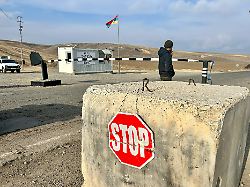Conflict with Azerbaijan
Armenia thinks new war is “very likely”
7/21/2023 9:33 p.m
Since the collapse of the Soviet Union, Armenia and Azerbaijan have been at odds over the Nagorno-Karabakh region. A new ceasefire agreement forces Armenia to give up large areas. But Prime Minister Pashinyan does not believe in compliance, because Azerbaijan is committing genocide, as he says.
Armenian Prime Minister Nikol Pashinyan fears another war in his country against Azerbaijan. “As long as a peace treaty has not been signed and ratified by the parliaments of both countries, a new war is very likely,” Pashinyan said in an interview. In it he also accused Azerbaijan of “genocide” against Armenians in the disputed region of Nagorno-Karabakh.
Since the collapse of the Soviet Union, both countries have been at odds over the Caucasus enclave, which is mostly inhabited by Armenians. There have already been two wars in the area that have killed thousands. After six weeks of fighting that left more than 6,500 dead in 2020, Russia brokered a ceasefire agreement that forced Armenia to give up large areas. Since then there have been deadly clashes on the Armenian-Azerbaijani border.
New escalation
The situation escalated again this month when Azerbaijan temporarily closed the so-called Lachin Corridor, the only road connection between Nagorno-Karabakh and Armenia. The lockdown sparked concerns about a humanitarian crisis in the region, which is facing shortages of food, medicine and electricity.
“We are not talking about the preparations for genocide, but about the ongoing process of genocide,” said Armenia’s prime minister. He accused Azerbaijani forces of creating a “ghetto” in Karabakh.
Last Saturday, Pashinyan and Azerbaijani President Ilham Aliyev met in Brussels for peace talks mediated by the EU, but there were no tangible results. Pashinyan called on the West and Russia to increase pressure on Azerbaijan.
The progress of the talks is being hampered by “Azerbaijan’s ongoing aggressive rhetoric and hate speech against the Armenians,” Pashinyan said. He accused Baku of pursuing a “policy of ethnic cleansing.” His country’s “red lines” in talks with Azerbaijan are “the territorial integrity and sovereignty of Armenia and the rights and security of the Armenians in Nagorno-Karabakh”.
Interference with territorial integrity?
Armenia’s case is “difficult” because the country’s interest in defending the residents of Karabakh “is perceived and interpreted by Azerbaijan as a so-called interference with its territorial integrity,” Pashinyan said.
During peace negotiations at the end of May, Armenia accepted to recognize Nagorno-Karabakh as part of Azerbaijan – but in return demanded international mechanisms to ensure the legal protection and security of the enclave’s Armenian residents. Azerbaijan, on the other hand, insists that such guarantees must be granted at national level and rejects an international format.
